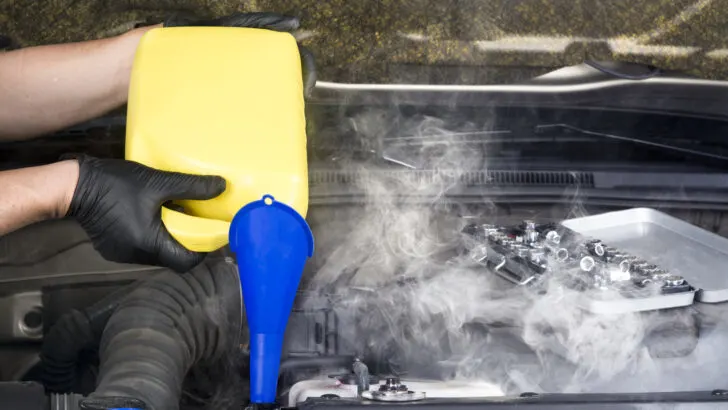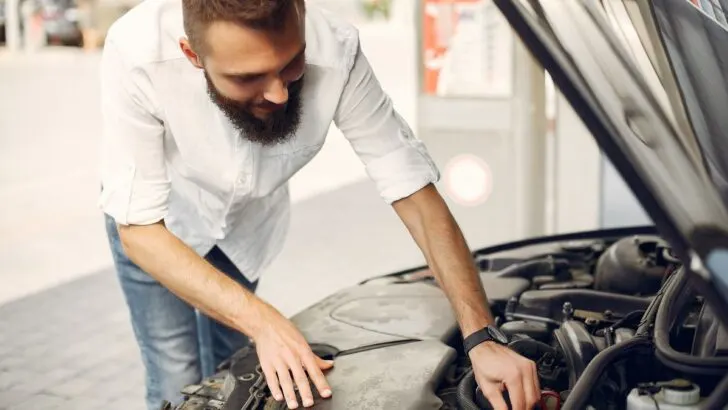You likely rely on your vehicle every day. Since it is such an important part of your life, you should take steps to keep it operating properly. This may include regular oil changes and tune-ups.
Unfortunately, even the best cared-for vehicle can experience issues. A common problem is overheating.
Knowing the signs that your car is overheating is important. If you continue to drive a vehicle in this state, it can cause extensive damage that will be expensive to repair.
Signs of an overheating car include an elevated temperature gauge, steam or smoke from the engine, coolant or burning smells, reduced engine performance, warning lights, strange noises, or sudden loss of power. Prompt attention is crucial to prevent further damage.
Here, you can learn more about each of the signs your vehicle is overheating and what steps to take if you find yourself in this situation.
Top Signs Your Engine Is Overheating
1. Hot Hood
When your vehicle’s engine runs, the hood will feel warm when touched. This is normal.
However, if the hood feels extremely hot, this is a cause for concern. If you are unsure if the hood is too hot, try leaving your hand on the surface for 10 seconds.
You should be able to do this comfortably; if you can’t, there could be an issue.
2. Temperature Gauge
Most vehicles have a temperature gauge as part of the instrument cluster on the dash. Some people mistakenly think this measures the outside temperature; however, this is not the case.
This gauge measures the temperature of your engine. If you see it moving toward the red temperature indicator, it is a sign that the engine is overheating.
Once the arrow is in the red section on the gauge, it means your engine is dangerously hot.
3. Steam
Another sign that your engine is overheating is if there is a cloud of steam coming from beneath your hood. While this may look like smoke, it is actually vapor.
Your cooling system, radiator, and engine are all located under your vehicle’s hood. The cooling system is designed to keep the engine from overheating. This is done with coolant.
If you see steam, it is a sign that the coolant has started to leak.
When it touches the engine or other hot components, it evaporates, and steam is formed. If there is a lot of steam from under the hood, it means you have a big leak, and your engine will likely overheat.
Another sign that your coolant is leaking is if you notice a puddle under your vehicle.
If your engine overheats because the coolant is leaking, it may crack or damage other parts under the hood. You should not continue driving, as this will only worsen the problem.
4. Ticking Sounds
Has your engine started to make a ticking sound you can hear while driving? If so, it means the oil is not lubricating the moving parts properly.
If your engine oil is overheated, it will lose its lubricating properties. When this happens, it works as water would rather than oil.
Without the oil, the mechanical parts may begin to hit each other, creating a ticking sound. This will result in increased wear and tear faster than usual.
A ticking sound indicates you need to seek repairs before your engine overheats.
5. Strange Engine Odors
Some drivers claim to “smell” the heat when their engine overheats.
Some of the smells that you may notice include:
- Burning Plastic Odor: From rubber seals to plastic valves, some of the engine components can start to melt as your engine overheats. This creates a burning plastic odor.
- Sweet Odor: The coolant in the radiator fluid includes ethylene glycol. This is like sugar on a molecular level. Because of this, it may smell sweet as it burns. Sometimes, drivers describe this as a butterscotch or maple syrup smell.
- Burning Oil Odor: As engine oil burns, it has a sulfur-like odor. Some people describe this as a smell like burning fuel.
6. Issues Accelerating
Have you noticed your car has difficulty maintaining speed or speeding up? If so, it is a sign of engine issues.
When your engine overheats, it will be sluggish. If you notice it is not responding as usual, watch for other signs it may be too hot, such as steam and smells.

What to Do if Your Engine Overheats
Now that you know the signs that your engine is overheating, you need to know how to respond to this situation.
If you notice any of the above signs, pull over. Turn the engine off and let it cool down. Doing this will help keep the engine and other parts from experiencing even more damage.
You can also leave your vehicle running after you pull over and turn up the heat. While this may seem counterintuitive, turning the heater on inside the cab will help pull the excess heat away from the cab.
This will help the engine cool down faster.
While you wait for your vehicle to cool down, it is best to contact a mechanic.
Let them know what is going on, so they can advise on what to do. In some situations, staying put and getting a tow to the shop will be best. In other cases, it may be safe for you to drive your car to the mechanic.
If you are having issues with your engine or believe it is overheating, get your vehicle to a professional. If you must look under the hood, be sure to wait until your vehicle has cooled down.
You must ensure you avoid coming in contact with hot metal or steam since this could cause a burn injury.
While having a vehicle overheat can be frustrating, you should know what to do. If you keep driving, it will cause more issues and lead to more expensive repairs.
Seek Professional Repairs if Your Car Overheats
If your vehicle overheats regularly, there is obviously a problem that needs to be addressed.
Taking your car to a mechanic will ensure the underlying issue is found and fixed.
This will help prevent additional issues in the future and keep your vehicle running efficiently.
If you found this article helpful, make sure to take a look at some of my other related articles below!
